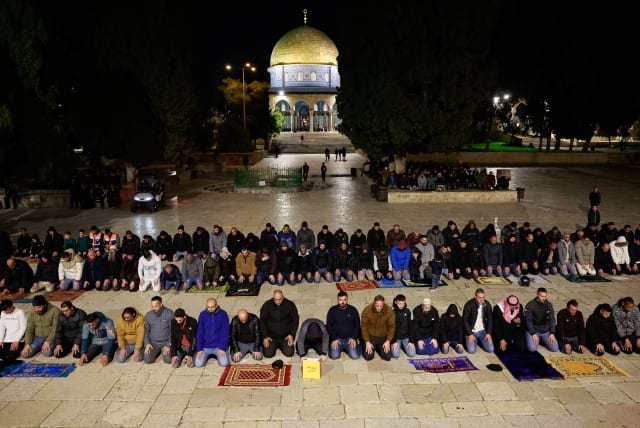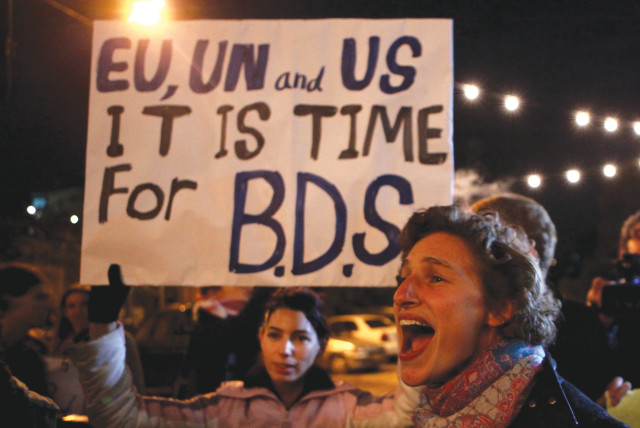Local products replace Western brands as boycott gains momentum on Ramadan

Amid the ongoing conflict, Arab nations intensify boycotts against brands such as McDonald’s, Coca-Cola, and Carrefour, promoting local brands in a show of solidarity with Palestinians.
“When adults remain silent, children’s voices will plead, and if the political scale tips, people’s justice will lead.”
These words open the four-minute ad for Ramadan of the Zain Group, a telecommunication company based in Kuwait. In the video, one sees Handala—a character created in 1969 by political cartoonist Naji al-Alid who has become a personification of the Palestinian people—guiding Palestinian children to the UN Security Council. Handala characterizes the suffering of the Palestinian people through music, images of flour bags covered in blood, and a display of empty children’s shoes meant to represent the young victims of the current war.
The ad finishes with the following statement: “I shall return, no land is yours, no promised fate, for each death certificate sealed, a thousand birth certificates I’ll create,” exemplifying the spirit of hope for Palestinians’ return to their land.
The war between Israel and Hamas in Gaza has profoundly affected Muslims globally, stirring deep emotional responses, particularly during the sacred month of Ramadan. This sentiment has spurred an unparalleled boycott of Israeli and American products among Arab and Muslim consumers. In addition, advertising agencies in Muslim nations, which previously worked with prominent American corporations and brands, have joined the boycott. Consequently, consumers and marketers in countries such as Egypt and Jordan have shifted their attention toward promoting local products.
The boycott, divestment and sanctions (BDS) movement started officially in 2005, a year after the International Court of Justice deemed Israel’s security barrier in the West Bank a violation of international law. This issue outraged Palestinian grassroots organizations and NGOs around the world. It inspired a global campaign to acknowledge the importance of the Palestinian cause and to end what they perceive to be Israel’s apartheid and settler-colonial policies. BDS has since focused on influencing people around the world to stop purchasing Israeli products or doing business with any international brands with ties to Israel.
While the BDS campaign has gained momentum over the years, its popularity soared after the breakout of Israel’s war in Gaza, which increased resentment throughout the Muslim world towards Israel.
Across the Muslim world
Today, Israel’s ongoing war, especially during the holy month of Ramadan, has further escalated the boycott. To weaken the US and European economies over their governments’ support for Israel, advertising companies in Muslim countries are promoting local brands while refusing to work with international ones accused of being pro-Israel.
In Egypt specifically, calls for the Israel boycott began to spread nationwide after Oct. 7, especially after the grand imam of Al-Azhar, Ahmed Al-Tayeb, called for it. Social media campaigns to boycott Israel also took off.
Egyptians and Jordanians, among others in the region, further intensified their boycott after McDonald’s in Israel announced that it would give free meals to Israeli soldiers being called up to war. In response, Arab countries boycotted the fast-food chain in their respective countries and have since extended their boycott to local franchises of famous companies such as Coca-Cola, Starbucks, Carrefour, Pepsi, Burger King, and Amazon.
This has also presented a crucial opportunity for new emerging local brands. In Egypt, for example, Spiro Spathis, an Egyptian soft drink company, has become a preferred substitute for Coca-Cola and Pepsi throughout the country.
“The direction of advertising for Ramadan this year in Egypt has taken a different path,” the CEO of an Egypt-based marketing agency who requested anonymity told The Media Line. “We don’t see advertisements of international brands such as Coca-Cola, but more local products, in order to boycott Israel and contribute to the local economy.”
According to him, the firm hasn’t seen large monetary losses from the boycott. “The business from local shops, NGOs, and brands has compensated for the amount of money lost from big international chains.”
“Almost everyone is boycotting in Egypt, and it doesn’t stop here. In fact, almost every Muslim country is going in the same direction,” he added. “Since our government has banished public demonstrations in favor of Palestine, this is the only effective way to show our solidarity with the Palestinians in Gaza.”
Issam W. Zaid, the founder and CEO of Viral Advertising Agency based in Ramallah, told The Media Line: “We are part of the boycott too. This hasn’t affected our company specifically, since we have turned to local products and try to sponsor only them. Although, compared to other countries boycotting, we are also facing problems related to the war itself.”
He explained: “Since the beginning of the war, Israel has stopped the work of Palestinians in the occupied territories and has also prevented them from entering Israeli settlements they used to work for.”
Local marketing companies in Jordan are similarly promoting the BDS goal. “In Jordan, we are carrying out a huge boycotting campaign, and we are the greatest example of it so far,” Ahmad Mahmoud, the CEO of Humanize Digital Group, told The Media Line.
However, unlike in Egypt, the boycott has presented economic challenges to many Jordanian marketing firms. “As a marketing company, this has certainly caused problems in terms of money because the big companies that we used to work with, and which had very high marketing budgets, are difficult to substitute with local businesses,” explained Mahmoud.
“On top of that, the franchises of international companies are the ones most affected by this phenomenon and with them local workers. For this reason, many Jordanian companies and small brands have decided to absorb those who have lost their jobs,” he added.
The BDS boycott of Israel, especially on social media platforms throughout Arab countries, shows no signs of slowing down. Advertisements, especially during Ramadan, further strengthen Muslims’ solidarity with Palestinians. In Kuwait, for example, a Ramadan commercial for the Zain Group portrays Palestinians suffering while calling attention to the lack of action from the international community to call for a cease-fire.
“The boycott is being followed by 40-60% of consumers in Egypt. Through marketing efforts, we see that many Egyptians keep asking about local brands instead of the boycotted products,” said Mekry, who added that “cafés like Starbucks in some areas across Cairo remain empty, a sign that the boycott is still ongoing.”
Giorgia Valente is a recent graduate of Ca’ Foscari University of Venice and an intern in The Media Line’s Press and Policy Student Program.
Jerusalem Post Store
`; document.getElementById("linkPremium").innerHTML = cont; var divWithLink = document.getElementById("premium-link"); if (divWithLink !== null && divWithLink !== 'undefined') { divWithLink.style.border = "solid 1px #cb0f3e"; divWithLink.style.textAlign = "center"; divWithLink.style.marginBottom = "15px"; divWithLink.style.marginTop = "15px"; divWithLink.style.width = "100%"; divWithLink.style.backgroundColor = "#122952"; divWithLink.style.color = "#ffffff"; divWithLink.style.lineHeight = "1.5"; } } (function (v, i) { });

